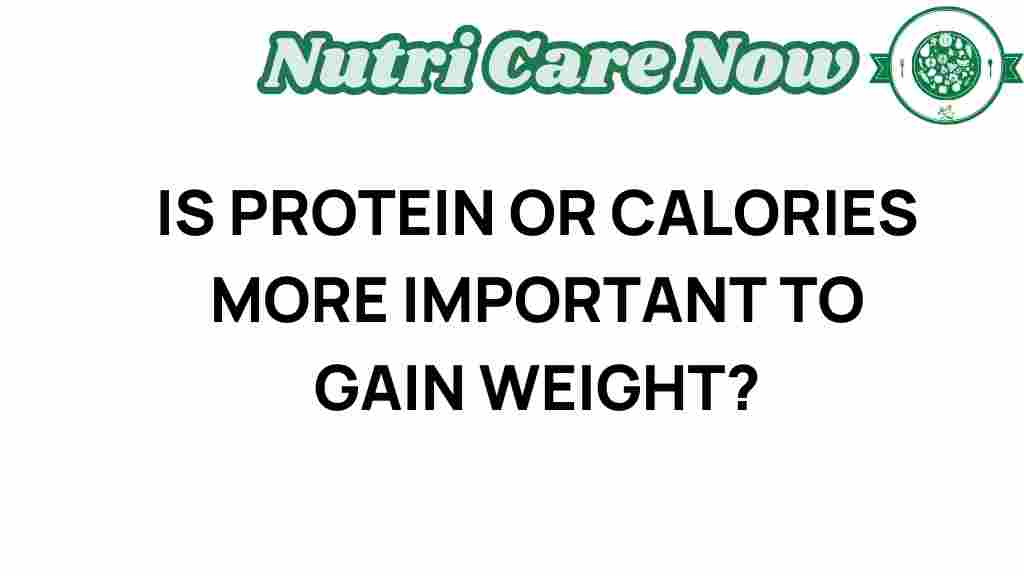The Weight Gain Dilemma: Is Protein or Calories the Key?
The journey to achieving your ideal body composition can often feel overwhelming, especially when it comes to understanding the roles of protein and calories in weight gain. With so much conflicting information available, many individuals find themselves questioning: should I focus on increasing my protein intake, or is it more critical to monitor my overall caloric intake? In this article, we will explore the relationship between protein, calories, and weight gain, offering insights into how to optimize your nutrition for your health and fitness goals.
Understanding Weight Gain: The Basics
Before diving into the specifics of protein and calories, it’s essential to understand the fundamentals of weight gain. Weight gain occurs when you consume more calories than your body expends. This caloric surplus can lead to an increase in body fat, muscle mass, or both, depending on your dietary choices and exercise regimen.
- Calories: The energy units derived from food that fuel your body.
- Protein: A macronutrient vital for muscle repair, growth, and overall health.
- Body Composition: The ratio of fat to lean mass in your body.
The Role of Macronutrients in Weight Gain
Macronutrients, which include carbohydrates, fats, and protein, play distinct roles in your body. For those looking to gain weight, especially in the form of muscle, understanding these roles is crucial.
- Protein: Essential for building and repairing tissues, protein is a critical component of muscle mass. Adequate protein intake can help ensure that weight gained is primarily lean mass rather than fat.
- Calories: While protein is vital, it’s important to remember that without a caloric surplus, you won’t gain weight. Calories provide the energy necessary for all bodily functions and activities.
- Fats and Carbohydrates: Both are also essential in a balanced diet, with fats playing a role in hormone production and energy, and carbohydrates providing immediate energy for workouts.
Protein vs. Calories: What Should You Prioritize?
When it comes to gaining weight, both protein and calories are important, but their priority can depend on individual goals.
1. If Your Goal is Muscle Gain:
Focus on protein intake. Research suggests that consuming sufficient protein can help stimulate muscle protein synthesis, especially when combined with strength training. Aim for:
- 1.6 to 2.2 grams of protein per kilogram of body weight.
- Spread protein intake evenly across meals.
2. If Your Goal is Overall Weight Gain:
Focus on a caloric surplus. Ensure that you are consuming more calories than you burn. A good starting point is:
- Increase your daily caloric intake by 250-500 calories.
- Monitor your weight weekly to adjust your intake as necessary.
Nutrition Strategies for Weight Gain
To effectively gain weight, consider the following nutrition strategies:
- Eat More Frequently: Incorporating 5-6 meals or snacks throughout the day can help increase your overall caloric intake.
- Choose Nutrient-Dense Foods: Opt for foods high in calories and nutrients, such as nuts, seeds, avocados, and whole grains.
- Incorporate Whole Foods: Whole foods are often more nutritious than processed foods and can help support overall health.
Step-by-Step Process to Monitor Your Progress
Gaining weight, especially in a healthy manner, requires a structured approach. Follow these steps:
- Step 1: Calculate your Total Daily Energy Expenditure (TDEE) using online calculators.
- Step 2: Establish a caloric surplus based on your TDEE.
- Step 3: Track your macronutrient intake, ensuring sufficient protein levels.
- Step 4: Adjust your diet based on weekly weight changes.
Common Troubleshooting Tips
Sometimes, individuals may struggle to gain weight despite following the recommended guidelines. Here are some troubleshooting tips:
- Increased Activity Levels: Ensure that you are not overexerting yourself during workouts, as excessive cardio can burn more calories than intended.
- Quality of Food: Focus on the quality of your food choices. Sometimes, a diet high in processed foods can lead to poor nutrient absorption.
- Hydration: Stay hydrated, but avoid drinking large amounts of water before meals to prevent feeling too full to eat.
Conclusion: Finding the Right Balance
In the weight gain dilemma, both protein and calories play critical roles. Ultimately, the key is to find a balance that works for your body and goals. By focusing on adequate protein intake while maintaining a caloric surplus, you can effectively manage your nutrition for optimal health and fitness.
For more detailed guidance on nutrition and fitness, consider checking out resources from established health organizations, such as the Academy of Nutrition and Dietetics. Remember, every individual’s body responds differently, so it’s essential to listen to your body and adjust as needed.
Ready to start your weight gain journey? Focus on your protein intake, keep an eye on your caloric consumption, and watch your body composition transform!
This article is in the category Diet and created by NutriCareNow Team
